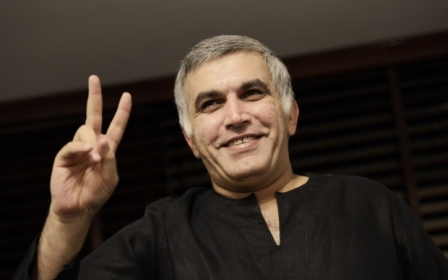Why Bahraini rights activists need international support

Last month - specifically, 14 February - marked the seventh anniversary of the peaceful protests that swept across Bahrain in 2011, calling for an end to authoritarian rule. Since the popular uprisings, however, intense and sustained state repression has left the Bahraini human rights movement increasingly challenged, amid dwindling international support.
Yet another blow fell last week. Prominent activist Nabeel Rajab was sentenced to five years in prison for tweeting about the war in Yemen and allegations of torture in Bahrain's notorious Jaw Prison. Rajab, who has been a vocal human rights advocate in Bahrain and across the Gulf for several decades, emerged as leading figure and organiser during 2011 pro-democracy protests.
Harsh campaign of state suppression
As a result of his uncompromising demands for respect for human rights, Rajab has invoked both the ire of Bahraini authorities and the support of Bahraini and international civil society. He has assumed pioneering roles in a number of national, regional and international civil society groups, including the Bahrain Center for Human Rights and the Gulf Center for Human Rights.
Rajab has been detained several times in a harsh campaign of state suppression and been imprisoned since June 2016 for speaking his mind on a television programme in 2015. With an estimated 4,000 political prisoners, the movement for democracy and human rights in Bahrain loses another leader.
International pressure also led to an inquiry after the brutal crackdown on demonstrations in 2011, which documented evidence of torture and human rights violations
Since the start of widespread peaceful demonstrations against the country's undemocratic rule in 2011, the Al Khalifa monarchy has severely restricted civil liberties through an orchestrated campaign of unlawful arrests, revocation of citizenship, enforced disappearances, prosecutions, and the detention and torture of activists and journalists.
Bahraini authorities are particularly intolerant of any attempts to communicate dissent internationally, fearing damage to its international reputation and standing among key allies, including Saudi Arabia, the United Kingdom and the United States.
The state's international connections are crucial to enabling it to repress dissent, as evidenced infamously in 2011, when Saudi troops intervened to crush democratic protests, causing numerous deaths.
Citizens' rights restricted
Under assault, Bahraini civil society activists need international support in order to keep up their fight for fundamental freedoms and democracy.
A recent report on the protest movement in Bahrain found that, after the lifting of restrictions on civil society organisations, activists believe that international pressure on the monarchy is the most important factor for keeping the pro-democracy movement alive.
First-hand testimonials from activists provide a telling assessment of the conditions in a country where citizens' rights, as rated by the online research tool CIVICUS Monitor, are among the most restricted in the world.
The civic-rights rating tool documents widespread suppression of protests, legal restrictions on the right to freedom of assembly and arbitrary arrests of protesters.
"The only protest and civil society leaders, including myself, who have been released from prison in Bahrain are those whose cases were aggressively taken up by the UN and the international community."
International pressure also led to an inquiry after the brutal crackdown on demonstrations in 2011, with documented evidence of torture and human rights violations. But that pressure has largely dissipated, and more must be done to motivate the UN, foreign states and international civil society groups to pressure Bahraini authorities to ease restrictions.
Forced into exile
The sustained campaign of state repression has taken a toll on Bahrain's pro-democracy movement. Although it has decreased in size, it still has a presence, and pro-democracy protests continue sporadically across the country on a daily basis. But the attrition continues. As restrictions continue to be imposed on protesters and perceived sympathisers, many of the movement's leaders have been arrested or forced into exile.
Others have had travel bans imposed, and some have even had their citizenship revoked, rendering them stateless. Some prominent leaders, such as Rajab, have been convicted in politically motivated trials and sentenced to prison terms.
International solidarity could make all the difference. Concerned citizens from countries that prop up the Bahraini state – including Saudi Arabia, the UK and US – could be proactive in bringing about change by calling on their leaders to use their influence and investments for good, and to insist that human rights are upheld, protest is permitted, and any abuses against citizens are investigated.
-Tor Hodenfield (@Tor_Hodenfield) is an American and British citizen. He holds degrees in human rights from the American University in Washington DC and University College London. Tor helps coordinate CIVICUS’ multilateral advocacy, including at the UN Human Rights Council, UN General Assembly and Universal Period Review.
The views expressed in this article belong to the author and do not necessarily reflect the editorial policy of Middle East Eye.
Photo: Bahraini protesters hold up a poster bearing portraits of jailed human right activists Nabeel Rajab and Abdul Hadi Al-Khawaja on May 1, 2015, in the village of Musalla, west of the capital Manama (AFP)
Stay informed with MEE's newsletters
Sign up to get the latest alerts, insights and analysis, starting with Turkey Unpacked
Middle East Eye delivers independent and unrivalled coverage and analysis of the Middle East, North Africa and beyond. To learn more about republishing this content and the associated fees, please fill out this form. More about MEE can be found here.






